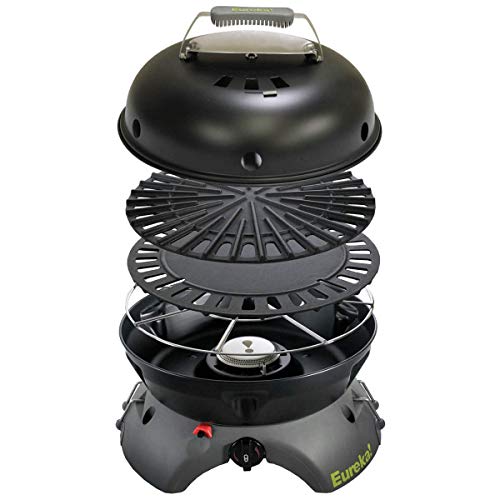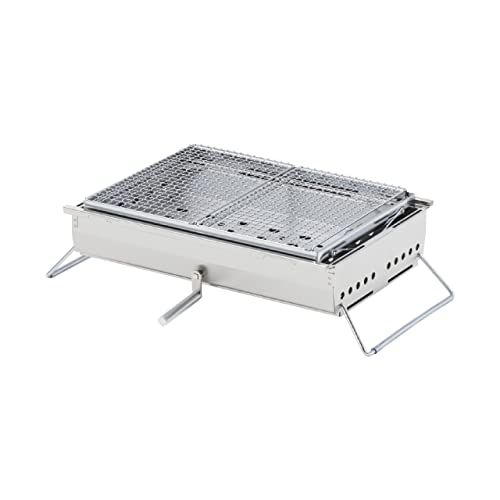Table of Contents
Are you an outdoor enthusiast looking for the perfect camping grill to enhance your cooking experience in the wild? Your search ends here! With countless options in the market, it can be overwhelming to choose the right one.
In this guide, we’ll walk you through the essential factors to consider, ensuring that you make an informed decision tailored to your needs. From heat sources to construction quality, we’ll help you find the best camping grill to satisfy your taste buds. Let’s dive in!
Here are the best 8 camping grills
Weber q1000 grill
Many customers consider it to be the best portable grill on the market. At 23 pounds, it’s light enough to take a small amount to a campsite that isn’t exactly next to your car.
The ignition and the regulator, where the propane connects, are both fragile on this Weber grill. If you’re a casual camper, remember to be gentle with the grill.
If you are a hard-core camper who requires great durability, this grill may not be for you.
Pros
- It is easy to start. A push-button ignition switch can rapidly get your grill up and running.
- The design is compact. A great grill for tabletop cooking that doesn’t skimp on cooking space.
- Reliable brand. When it comes to grills, Weber is unbeatable.
Cons
- Design flaws. Installing the propane tank to the regulator is a challenging task.
Weber q1200 titanium propane grill
This is one of the MOST TRUSTED brands in the industry, and the Q1200 is no exception.
It has a quick-heat option, so you don’t have to wait for it to heat up when you’re hungry at the end of a hard day, even if it’s windy!
It also has a catch pan and an angled grease tray to trap all that fat.
Pros
- Fold-in side tables for prepping
- Built-in thermometer
- Easy to clean
- Wheeled stand option (sold separately)
- Cast iron
Cons
- Expensive
- Bulky
Coleman road trip 285 Stand-Up Grill
This grill pack’s most amazing feature is its power. It’s powered by propane. It has 20,000 BTUs, which is more than enough to cook several large meals.
However, one disadvantage of that kind of power is that it depletes propane quickly. Coleman sells an accessory that allows you to connect the grill to a larger propane tank, useful for extended camping trips.
This Coleman grill’s portability is also amazing, with a design that allows you to pull it like a rolling suitcase.
Pros
- It has plenty of power. This camping grill has three burners and 20,000 BTUs of power.
- A range of colors. Choose from the following colors: black, green, blue, red, or orange.
- Unrivaled lighting
- Lightweight. It’s a great weight and size for this degree of cooking power.
- Built-in table and casters
- Other cooktops are available for purchase
Cons
- Difficult to keep clean. It takes a few practice cleanings to get the hang of it.
- It produces uneven heat on high.
- It requires more storage space than a tabletop option
Cuisinart portable charcoal grill
This 14-inch portable charcoal grill combines the look and features of a traditional charcoal deck grill in a small form. It stands just over a foot tall due to its shorter legs, and it weighs only 5 pounds, making it easy to carry in the car.
The built-in clamps help keep the lid in place even when traveling through rough terrain.
Despite its low price, the grill has an enamel-coated firebox, a chrome-plated grill grate, and an ash catcher. The dual vents allow you to cook at low and slow temperatures or high temperatures for steaks, burgers, and barbecues.
Pros
- Temperature control
- Built-in clamps hold the lid
- Chrome grill grate
- Affordable
Cons
- Not compatible with propane canisters
Biolite Portable Grill
This tiny camping grill, powered by sticks found around the campsite, can hold around two hamburger patties or four to six hotdogs at a time. This makes it an ideal grill for couples that enjoy camping.
Despite its modest size, the fuel intake lid allows it to heat up quickly. When the door is opened, the heat is reduced. When closed, it focuses on the entire cooking area.
As a bonus, this BioLite grill has USB ports for smartphone charging and is fueled by sticks collected at your campground.
Pros
- Extremely portable. This is by far the most portable camping grill on our list.
- Easy refueling. To power, this grill simply collects tiny sticks from around your campground.
- Containing charging your smartphone. The burner can also be used to charge your smartphone.
Cons
- Limited cooking space. The cooking surface is a significant sacrifice for portability. You can only create two average-sized burgers at a time.
Eureka gonzo grill camp stove
The secret to this adaptable and compact cooking system is its changeable cast-iron cooking surface, which may be used as a griddle for pancakes or a grill for burgers and poultry.
Because this grill is powered by propane, be sure you bring enough gas with you to last the duration of your camping trip.
You’ll also be pleased to learn that, considering its versatility, this Eureka grill is reasonably priced.
Pros
- Quick heating. This multifunctional grill heats up quickly, allowing you to go to work on dinner straight away.
- It can be used as both an oven and a grill.
- Great versatility. This camping grill can function as a grill, griddle, or stove.
- Compact. All of the components fit into a small circular grill.
- Compatible with other Gonzo products
Cons
- There is no carrying case. That will cost you more money.
- Difficult to clean. While this is a norm with many grills, cleaning all of the individual components takes time.
- Limited cooking space
- Pricey
Cuisinart petit gourmet tabletop grill
When not in use, the grill is compact, making it ideal for tabletop cooking. Even though it only has 145in² of cooking space, it can still fit eight hamburger patties and three hotdogs.
You’ll need to bring your propane, but that’s hardly the end of the world. The burners are perfectly placed, providing uniform heat throughout the grill.
Several users have claimed that this Cuisinart grill is difficult to clean. However, this is a frequent complaint about camping grills.
Pros
- Superior quality. Cuisinart is well known for its long-lasting performance in the kitchen and at camping.
- Easy to set up. It’s easy to attach any size propane tank to this camping grill.
- Efficient. There’s a surprising amount of cooking space for a small camping grill.
- Folding legs
- Adjustable height
- Lightweight
Cons
- Not the most portable option. It’s quite small, but it doesn’t collapse for easy storage.
- Plastic components near high heat
- A little drip pan.
Snow peak double bbq box
While this is a charcoal grill, a few temperature adjustment features allow you to achieve the ideal level of heat precision. The grate’s lid can keep heat in for denser meats, and a height adjustment can dial down or crank up the temperature as needed.
One disadvantage is the weight. It’s rather heavy for its size, but that adds to its stability and durability.
Pros
- Ample grilling space
- Simple temperature control. You can regulate superior cooking temperatures with an easy-to-use height adjustment tool.
- Extremely durable. High-quality stainless steel was used in its construction.
Cons
- Difficult to transport. There are no side handles, which would make it easier to carry.
Buying Guide for Camping Grills
Heat Source: What Powers Your Grill?
Camping grills can be powered by different fuel sources, each with its unique characteristics:
- Propane: Common and efficient but less effective in winter. It costs about $2 to $2.75 a gallon.
- Butane: Similar to propane, but better in cooler temperatures.
- Electric: Uncommon for camping and requires a strong battery or power source.
- Wood/Coal: Ideal for a smoky flavor, but takes longer to heat. Wood can often be found near the campsite.
Grilling Surface: Cooking Space Matters
The cooking surface depends on how many people you usually cook for during your camping adventures.
- Small Groups: A grill like the Cuisinart Petit Gourmet Tabletop Grill (145in²) is perfect.
- Large Groups: Consider the Weber Q1000 Grill or buy two smaller grills for flexibility.
Construction Quality: Durability and Material
The build material ensures that your camping grill withstands wear and tear:
- Cast Iron: Easy to clean and improves with use.
- Stainless Steel: Prevents warping but harder to clean.
Ease of Use: Making Your Cooking Convenient
- Ignition: Battery-powered quick-start ignitions are common in gas-powered grills.
- Temperature Adjustment: Gas grills make it easier, but wood and coal require patience.
- Cleaning: Consider grills that can be easily disassembled, like the Kovea Magic III Stainless BBQ Pit.
- Portability: Size, weight, and mobility matter if you need to travel light, like the Eureka SPRK Camp Grill.
Additional Features to Consider:
- Temperature Control: Look for grills with control options and built-in thermometers.
- Shelving: Some grills have fold-away side tables for convenience.
- Adjustable Legs: Stability and adjustable height make cooking more comfortable.
- Versatility: Consider grills that can accommodate pots, and pans, or even serve as a firepit.
Frequently Asked Questions:
- Difference between Camping Stove and Grill: A camping grill distributes heat evenly, while a stove provides targeted heat.
- Using a Griddle on the Grill: Yes, but ensure uniform heat distribution.
- Boiling Water on a Portable Grill: Possible with metal pots or kettles.
- Best Grills for the Beach: Look for light, portable grills with wind guards.
Conclusion:
Choosing the right camping grill doesn’t have to be complex. By understanding the different fuel sources, cooking surfaces, construction quality, and additional features, you can find a grill that fits your needs and budget. Happy camping and grilling!









